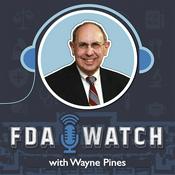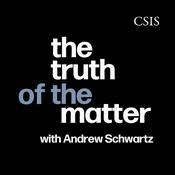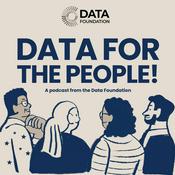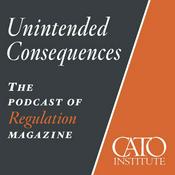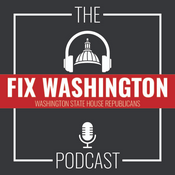157 episodes
- Welcome to your weekly EPA update, listeners. The biggest headline this week: EPA Administrator Lee Zeldin, alongside President Trump, finalized the single largest deregulatory action in U.S. history by rescinding the 2009 Greenhouse Gas Endangerment Finding and repealing all federal GHG emission standards for new vehicles and engines from model year 2012 onward. EPA argues the Clean Air Act doesn't authorize regulating vehicle emissions for climate change, citing Supreme Court rulings like West Virginia v. EPA and the major questions doctrine.
This caps a whirlwind of rollbacks. Just days earlier at Kentucky's Mills Creek Power Plant, EPA repealed Biden-era amendments to the Mercury and Air Toxics Standards for coal plants, sticking to the proven 2012 rules. Those have slashed mercury emissions 90% since pre-MATS levels, acid gases over 96%, and non-mercury metals more than 81%, saving $670 million in costs for lower energy bills. Deputy Administrator David Fotouhi said, "The 2012 MATS Rule is fully protective... This action follows the rule of law and will reduce the cost of generating baseload power."
For American families, expect cheaper gas and electricity short-term, but health groups like the American Lung Association warn of more asthma attacks, ER visits, wildfires, and floods. Businesses in auto, oil, and coal cheer $1.3 trillion in projected savings and restored energy dominance. States face uncertainty—California's stricter standards may stay preempted without EPA waivers, recently nixed by Congress. Internationally, it signals U.S. retreat from climate leadership, straining Paris Agreement ties.
Experts clash: Clean Air Task Force's Frank Sturges calls it "legal sophistry" ignoring stronger science, while EPA insists it's law-bound. Legal challenges are underway from Lung Association, nurses, and Earthjustice.
Watch for methane rule reviews and court fights—the rule awaits publication, with suits already filed. Citizens, submit comments via EPA dockets or join public hearings.
Stay tuned for court rulings. For more, visit epa.gov. Thanks for tuning in—subscribe now! This has been a Quiet Please production, for more check out quietplease.ai.
For more http://www.quietplease.ai
Get the best deals https://amzn.to/3ODvOta
This content was created in partnership and with the help of Artificial Intelligence AI - Hey listeners, welcome to your weekly EPA update. This week's bombshell: EPA Administrator Lee Zeldin, alongside President Trump, just finalized the single largest deregulatory action in U.S. history—repealing the 2009 Endangerment Finding on greenhouse gases and scrapping all federal GHG emission standards for vehicles from model years 2012 through 2027 and beyond. EPA's own announcement calls it a $1.3 trillion win for taxpayers, restoring consumer choice by ditching mandates like off-cycle credits and the unpopular start-stop tech in cars.
This policy reversal, rooted in recent Supreme Court rulings like Loper Bright and West Virginia v. EPA, argues the Clean Air Act never gave the agency authority to regulate GHGs for climate change— that's Congress's call. It doesn't touch rules on smog or toxic air pollutants, but critics are furious. Clean Air Task Force attorney Frank Sturges says, "No amount of legal sophistry can evade the science—greenhouse gases endanger public health, and we'll challenge this in court." World Resources Institute's David Widawsky warns it hikes energy bills, insurance costs, and grocery prices from hotter weather and lost crops, hitting families hard.
For American citizens, expect cheaper cars and trucks upfront, but groups like the Asthma and Allergy Foundation of America note rising asthma risks—9 to 11 daily deaths linked to pollution triggers worsened by climate. Businesses cheer lower compliance costs, especially auto makers and truck fleets. States lose federal GHG mandates but face lawsuits; locals might see more affordable goods via reduced trucking expenses. Internationally, it signals U.S. pullback from climate pacts, straining ties.
Legal challenges from health groups kick off soon—watch court dockets. Citizens, check EPA's website for rule details and submit comments if new actions arise.
Stay tuned for court battles and Congress moves. For more, visit epa.gov. Thanks for tuning in—subscribe now! This has been a Quiet Please production, for more check out quietplease.ai.
For more http://www.quietplease.ai
Get the best deals https://amzn.to/3ODvOta
This content was created in partnership and with the help of Artificial Intelligence AI - Hey listeners, welcome to your quick dive into the EPA's biggest moves this week. The top headline? On February 12th, President Trump and EPA Administrator Lee Zeldin announced the single largest deregulatory action in U.S. history: rescinding the 2009 endangerment finding on greenhouse gases and scrapping all GHG emission standards for light, medium, and heavy-duty vehicles from 2012 through 2027 and beyond.
Trump called it a "disastrous Obama-era policy that severely damaged the American auto industry and massively drove up prices for consumers." Zeldin added, "The red tape has been cut. Manufacturers will no longer be burdened by measuring, compiling, or reporting greenhouse gas emissions for vehicles and engines. And the forced transition to electric vehicles is over."
This ties into the FY 2026 budget, which prioritizes energy independence by reevaluating rules like the Clean Power Plan 2.0, methane regs for oil and gas, Mercury and Air Toxics Standards for coal plants, and over 25 hazardous air pollutant rules. They're launching an Office of State Air Partnerships for better coordination on permitting, streamlining state implementation plans, and proposing at least four new source performance standards. Programs like Diesel Emissions Reduction and Radon grants face cuts to eliminate federal overreach, while Superfund shifts to taxes for cleanup and PFAS gets targeted with new methods.
For American citizens, expect lower car prices and cheaper energy—families save big on vehicles without forced EV mandates. Businesses, especially auto, oil, gas, and power sectors, gain flexibility, cutting costs and boosting jobs; one plant already reversed closure. States like California disagree—Governor Newsom slammed it as "pro-pollution," prepping lawsuits and own rules—while the U.S. Climate Alliance calls it a denial of science. Local governments see streamlined air permitting but potential backlash on backlogged plans.
Experts at the World Resources Institute warn of riskier lives: hotter summers hiking bills, extreme weather spiking insurance, lost crops raising food prices. No international angles yet, but it prioritizes U.S. economy over global GHG pacts.
Watch for FY26 rule proposals on power plants and oil wastewater by year-end, plus Class VI well permitting standards. Citizens, comment on epa.gov dockets or contact your reps—public input shapes these.
Next, track state lawsuits and budget congressional fights. For more, hit epa.gov/newsreleases. Tune in next time, subscribe, and thanks for listening. This has been a Quiet Please production, for more check out quietplease.ai.
For more http://www.quietplease.ai
Get the best deals https://amzn.to/3ODvOta
This content was created in partnership and with the help of Artificial Intelligence AI - Welcome back to your weekly EPA update, listeners. This week, the biggest headline from the Environmental Protection Agency is their aggressive push on PFAS forever chemicals, with Administrator Lee Zeldin announcing major year-one wins under President Trump, including advanced drinking water standards for PFOA and PFOS, Superfund listings, and treatment systems protecting over 9,500 households in California alone.
EPA's rolling out real action: they've finalized consent orders for PFAS foam removal at Maine's Brunswick Airport, installed 108 water treatment systems in New Jersey, and updated disposal guidance annually. Zeldin says, "Keeping Americans safe from PFAS risks has been a top priority... We're locating it, stopping it from drinking water, cleaning it up, and holding polluters accountable." They're also launching a coordinating group across offices to speed research and enforcement.
On deregulation, EPA's eyeing 2026 rollbacks like rescinding the 2009 climate endangerment finding and delaying Biden-era vehicle emission rules for cars and trucks through 2028, per C&EN reports. Farmers get a win too: strongest-ever dicamba protections for cotton and soy, halving application rates to 1 lb per acre max for two seasons, plus new temperature and buffer rules. And they've proposed Renewable Fuel Standards, setting advanced biofuel at 9.02% for 2026.
For American citizens, cleaner water from PFAS cleanup means safer health for families, but looser emissions could mean more air pollution—watchdogs note enforcement cases dropped 76% last year. Businesses cheer repair rights for farm equipment, saving costs, and dicamba limits balance weed control with drift risks; chemical firms worry repeal shakes investments. States gain from partnerships on Superfund sites, though some face haze program tweaks.
Experts like former EPA deputy Stan Meiburg warn climate science is stronger now, so repeal fights loom. Deadlines: dicamba rules kick in next season; comment on water certification by February 17.
Keep eyes on early 2026 final rules for power plant emissions and endangerment. Dive deeper at epa.gov/newsreleases. If you're near a site, report PFAS tips via their hotline.
Thanks for tuning in, listeners—subscribe for more. This has been a Quiet Please production, for more check out quietplease.ai.
For more http://www.quietplease.ai
Get the best deals https://amzn.to/3ODvOta
This content was created in partnership and with the help of Artificial Intelligence AI - Here's your EPA podcast script:
---
The Trump administration's EPA is taking a major swing at air quality regulations this week, and it's shaking up how the government values clean air itself. According to Manufacturing Dive, the EPA is moving to overturn a Biden-era standard that lowered the annual limit for fine particulate matter from twelve micrograms per cubic meter to nine. That rule, which took effect in May 2024, was projected to prevent forty-five hundred premature deaths and deliver between twenty-two and forty-six billion dollars in health benefits. But manufacturers say the stricter standard is unachievable, and the Trump EPA agrees.
Here's what's really significant: the EPA just announced it will no longer calculate a dollar value for health benefits when changing pollution regulations. According to ABC News, the agency says the modeling isn't robust enough, though Administrator Zeldin posted that the EPA will still consider lives saved. Environmental experts worry this fundamentally changes how future rules get evaluated, potentially stacking the deck in favor of more pollution.
But the EPA isn't rolling back everything. The agency is actually cracking down on diesel engine manufacturers. As reported by the EPA directly, Administrator Zeldin is demanding detailed data on diesel exhaust fluid system failures that have plagued farmers and truckers. The EPA already issued guidance last August allowing farmers and independent repair shops to fix their own equipment, addressing years of frustration in agricultural communities.
On water protection, the EPA proposed new rules on January thirteenth that would restrict state and tribal authority under the Clean Water Act. Environmental groups say this weakens a critical safeguard, though the agency says it's streamlining the certification process. The comment deadline is February seventeenth, so listeners interested in water quality should act quickly if they want their voices heard.
The agency is also reassessing vehicle emissions rules and renewable fuel standards, signaling a shift toward balancing environmental goals with industry concerns. For farmers and businesses watching permitting timelines, the coming months will be crucial as these rules reshape.
Head to quiet please dot ai for full coverage and resources. Thank you for tuning in, and please subscribe.
This has been a quiet please production, for more check out quiet please dot ai.
For more http://www.quietplease.ai
Get the best deals https://amzn.to/3ODvOta
This content was created in partnership and with the help of Artificial Intelligence AI
More Government podcasts
Trending Government podcasts
About Environmental Protection Agency (EPA) News
"Discover insightful discussions on environmental conservation and public health with the 'Environmental Protection Agency (EPA)' podcast. Tune in to explore expert interviews, latest policy updates, and innovative solutions for safeguarding our planet. Join us in promoting sustainability and protecting our environment for future generations."For more info go to Check out these deals https://amzn.to/48MZPjs
Podcast websiteListen to Environmental Protection Agency (EPA) News, The DSR Network and many other podcasts from around the world with the radio.net app
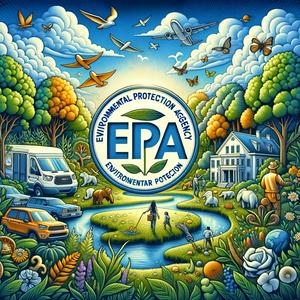
Get the free radio.net app
- Stations and podcasts to bookmark
- Stream via Wi-Fi or Bluetooth
- Supports Carplay & Android Auto
- Many other app features
Get the free radio.net app
- Stations and podcasts to bookmark
- Stream via Wi-Fi or Bluetooth
- Supports Carplay & Android Auto
- Many other app features


Environmental Protection Agency (EPA) News
Scan code,
download the app,
start listening.
download the app,
start listening.
























